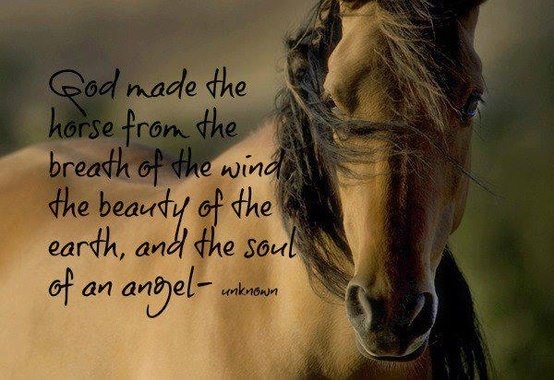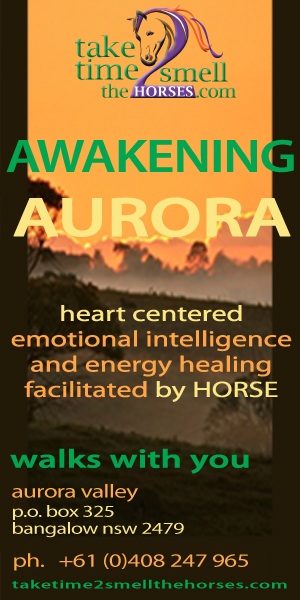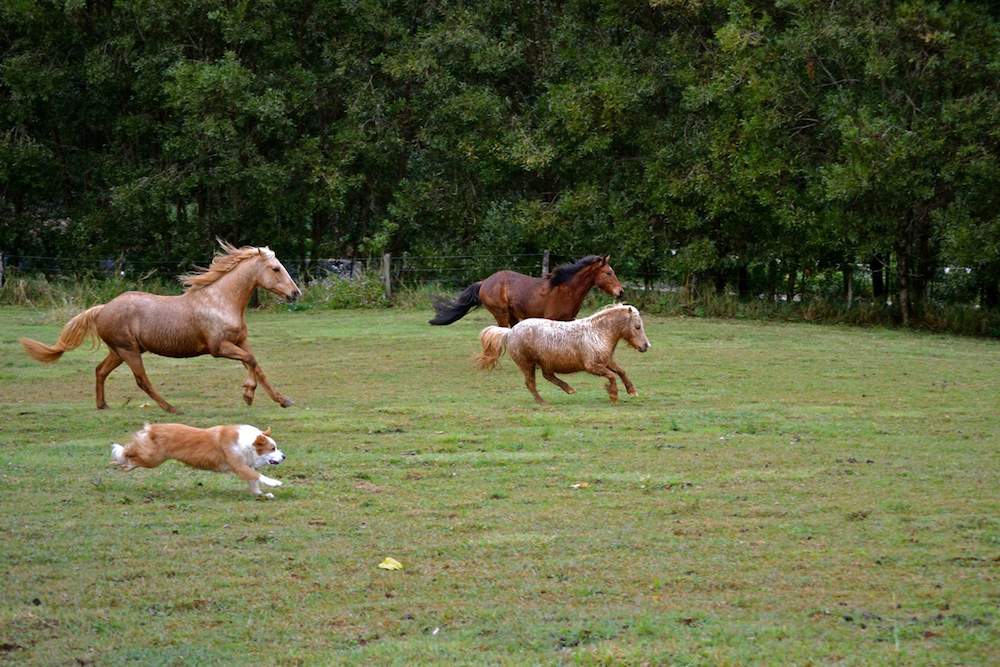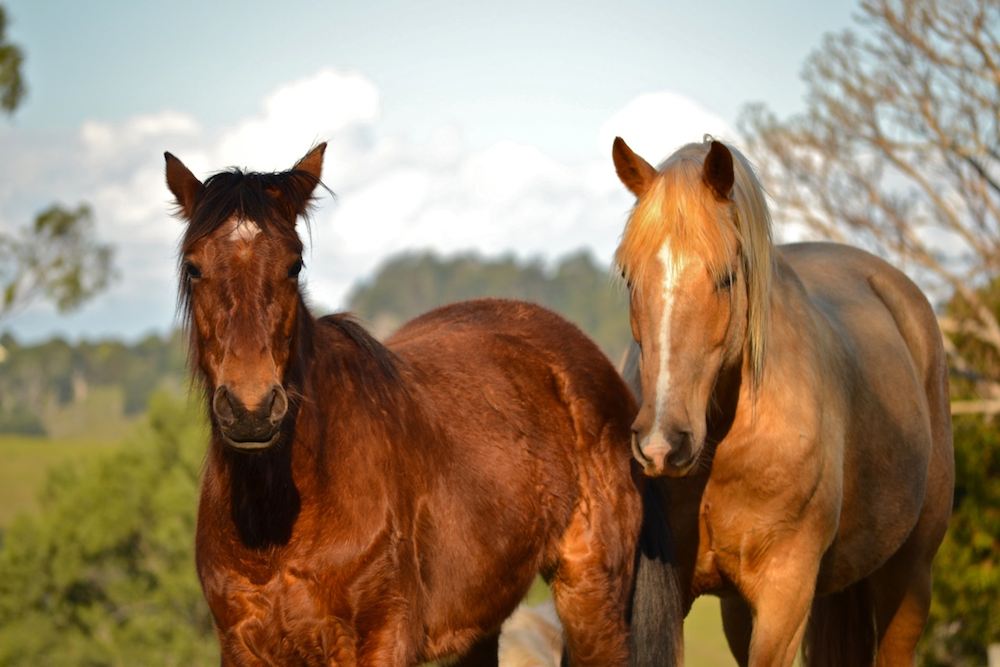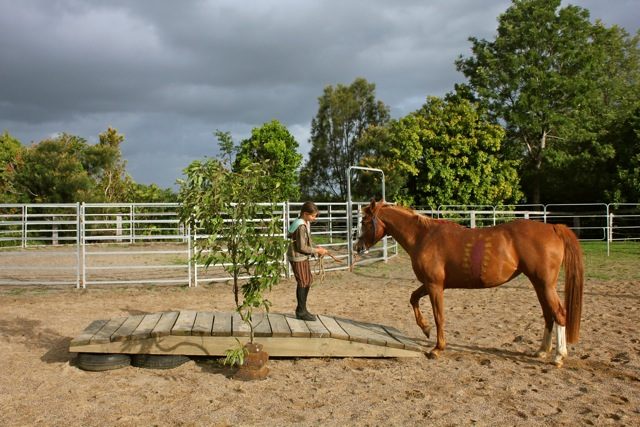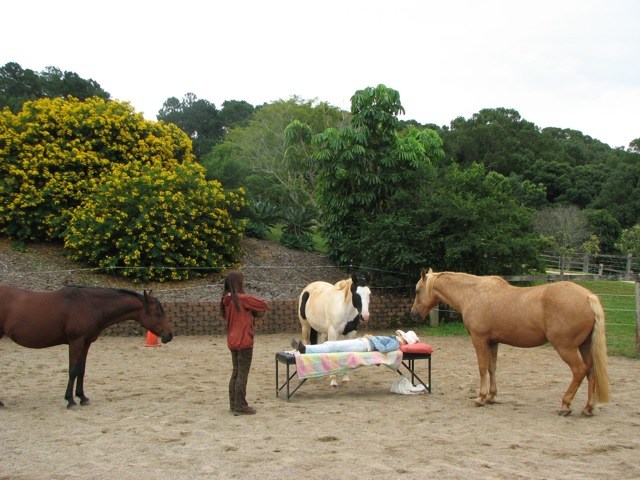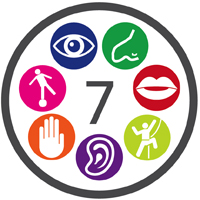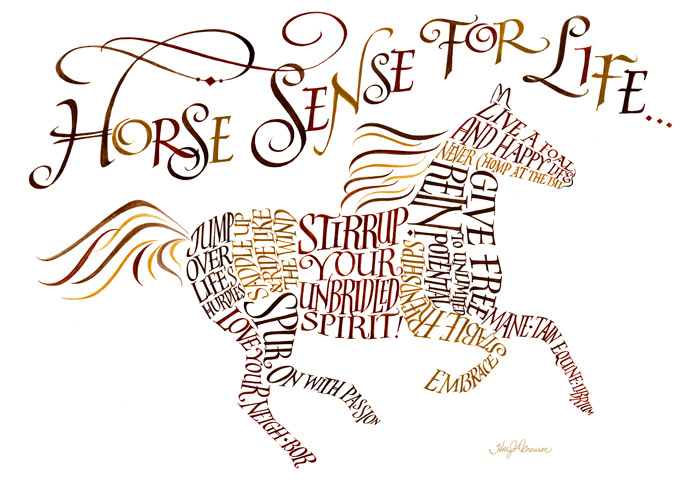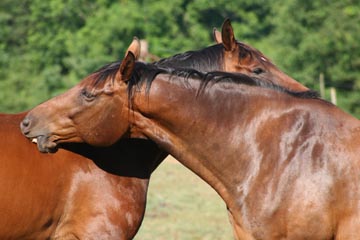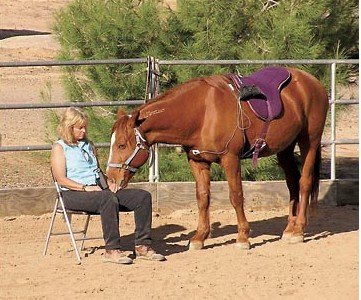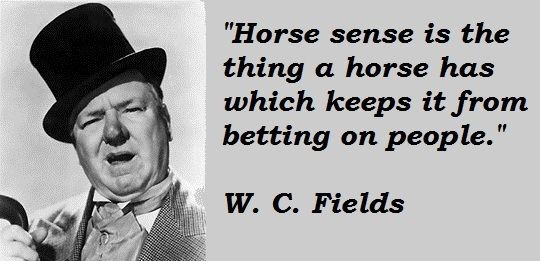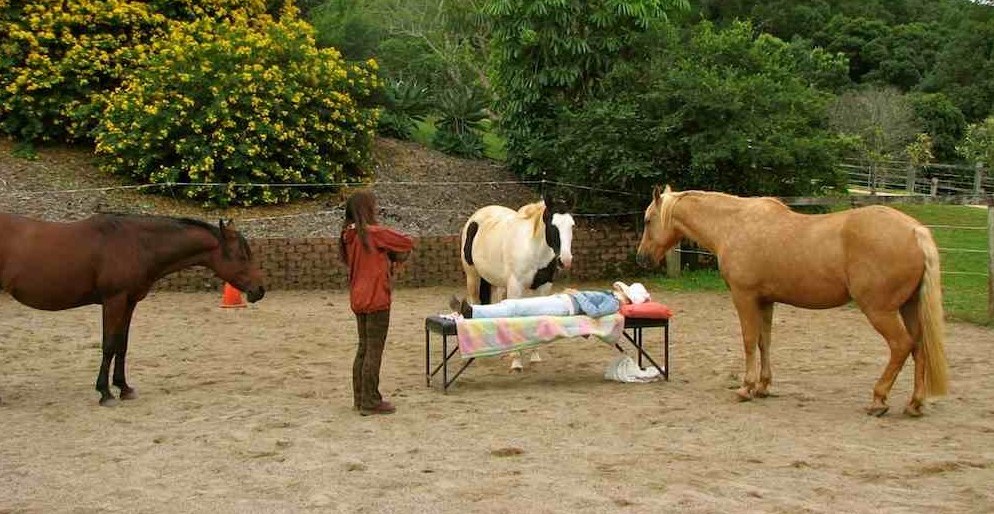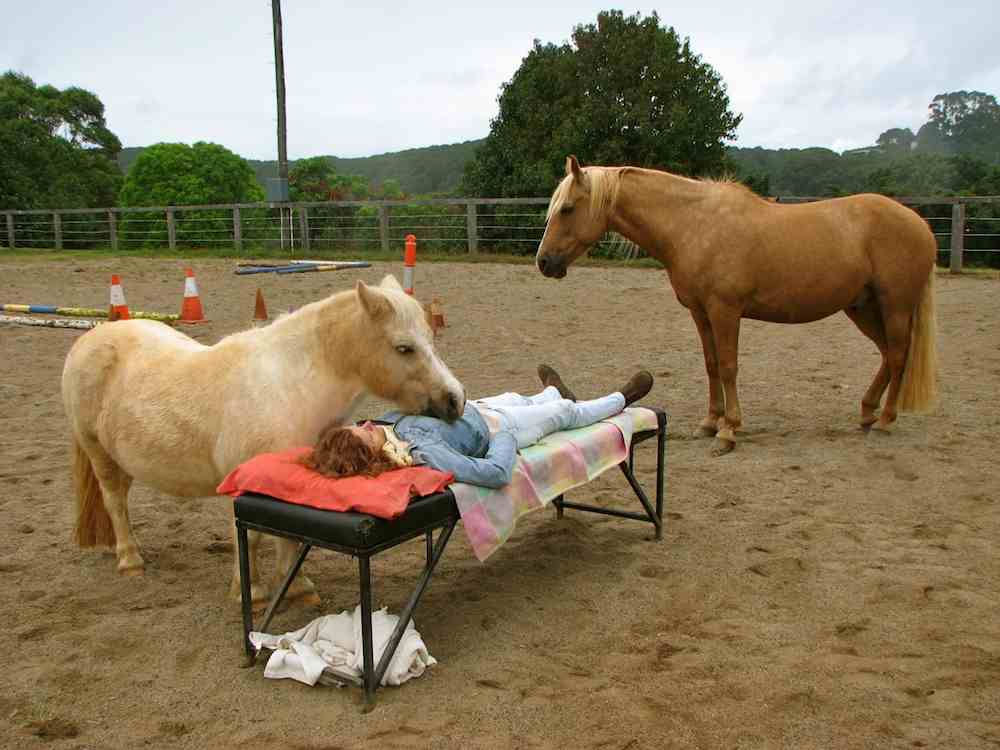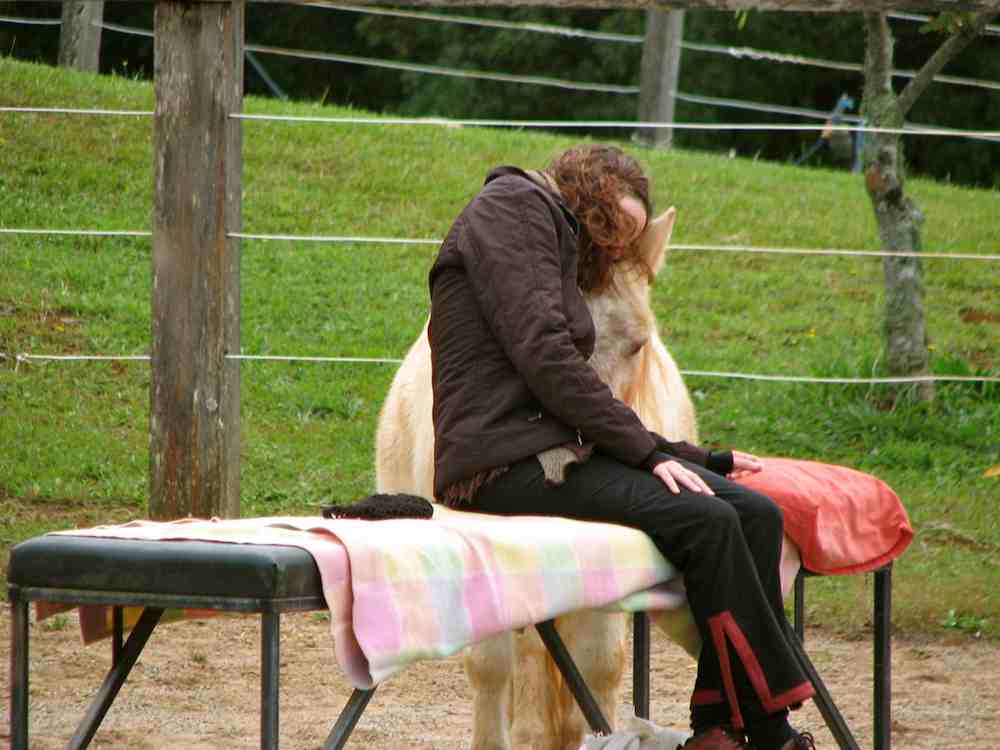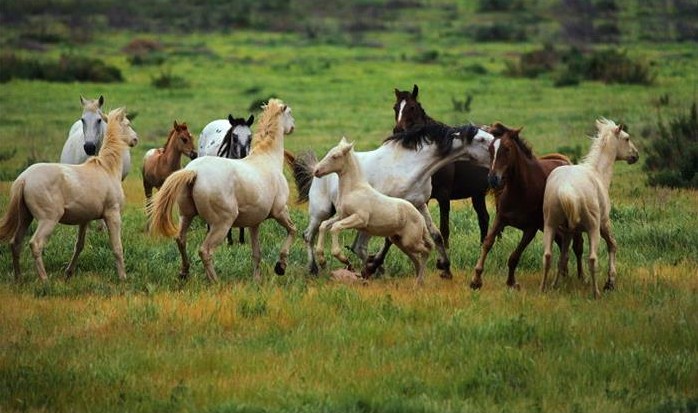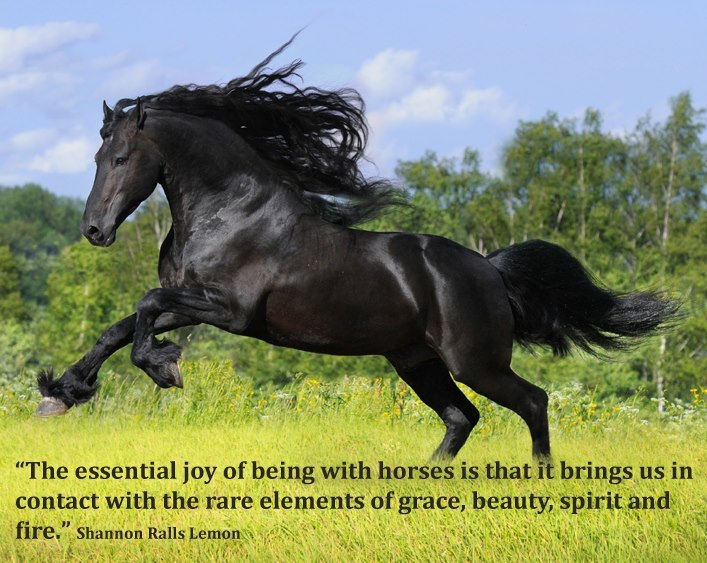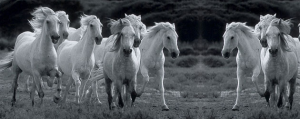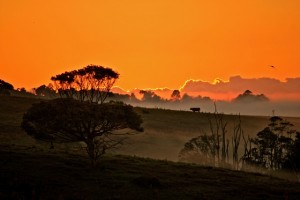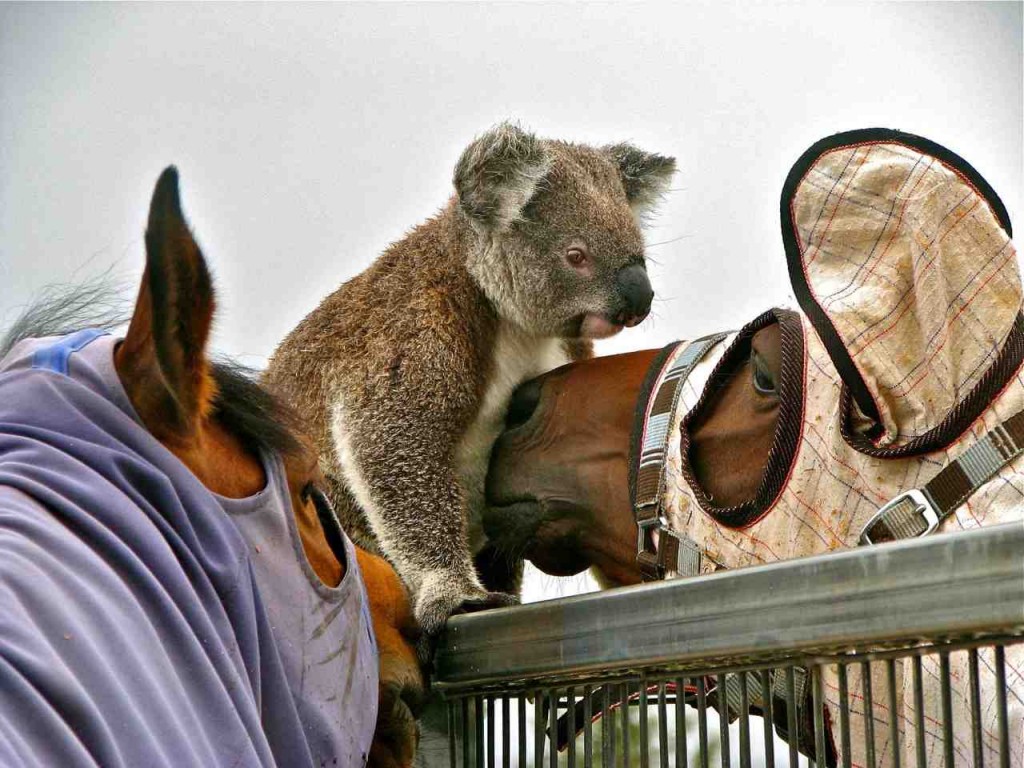The post To paraphrase the poet – trust in God but tether your horse appeared first on .
]]>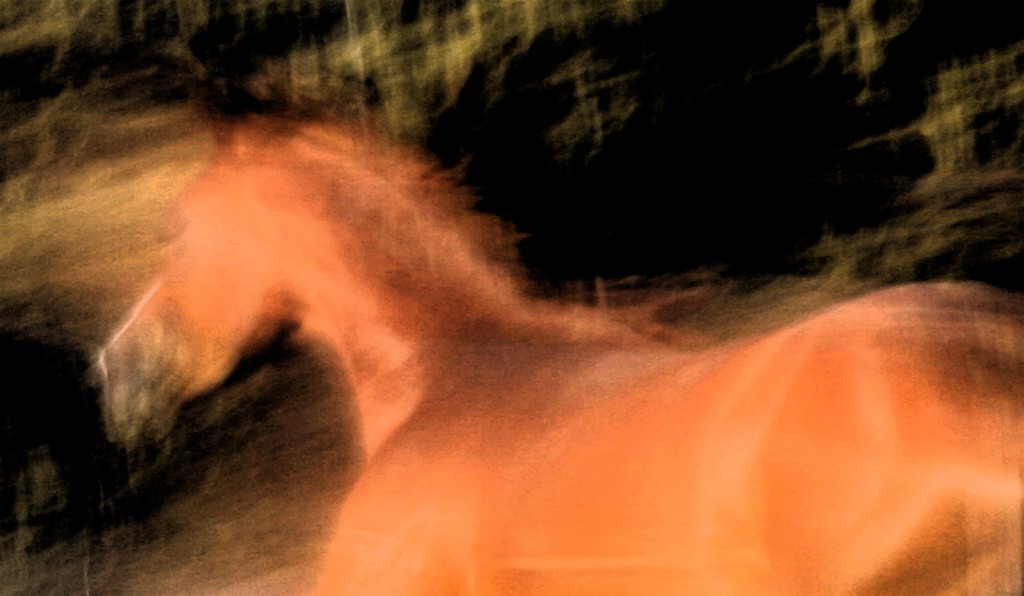
Aliya gallops. Photo: Candida Baker
Living in conscious awareness of the moment, in the same way horses do, can dramatically increase our sense of well-being, writes Beate Sommer from Take Time to Smell the Horses.
I’m going to begin by telling one of my favourite stories from Wisdom of the Sands – Discourses on Sufism (Vol.1) by Osho. It’s a slightly modified version, because I’m replacing the traditional camel in the story with a horse.
A Master was travelling with his disciple. The disciple was in charge of taking care of the horse. They came to an inn later that night and it was the disciple’s duty to tether the horse, only he didn’t bother and simply prayed to God ‘Take care of the horse’.
The next morning the horse was gone. The Master asked, ‘Where is the horse?’ The disciple answered, ‘I don’t know. Ask God. I told him to look after it. I am not responsible because I asked God very clearly! And don’t you go on teaching “Trust God” and so I trusted.’ The Master said, ‘Trust in God but tether your horse first – God has no other hands than yours.’
It is easy to trust in God/Spirit and be lazy. It is also easy to not trust in God/Spirit and be a doer. It takes practice to trust in God/Spirit and be a doer at the same time! God/Spirit is the real doer. We are just instruments in his/her hands. Every little action is God/Spirit working through us
Our life energy plus divine support is embodied trust. We need both – acting with strength and surrendering. Our most powerful tool is the breath, breathing our own breath and being breathed by Divine Breath. Going through life we find ourselves in a diverse range of experiences – sad, happy, successful, difficult, busy, peaceful – and it is important to live with compassion for the world for every sentient being and for ourselves. In my studies of the Aramaic Beatitudes (see my blog: www.beatitudeway.wordpress.com) I recently came across this definition of compassion: Compassion is the joyful suffering of growing which replaces the anxiety of not trusting life.
So what does all of this have to do with horses other than that in the story I have changed a camel for a horse
Well, it is in the horse’s nature to be relaxed and trusting and when a situation requires attention to deal with it efficiently and then go back to relaxed grazing. It seems to me that horses live from a still and peaceful inner place from which all activity arises, unfolding and expanding from this sacred space within. Society, however, is built on distracting us from being in this stillness, which causes us stress, tension and pain.
In my studies of Sufism I also came across the following: From a still centerpoint we unfold into a larger circle with definite boundaries; this begins by our rediscovering sacred space inside. (The Sufi Book of Life, 99 Pathways of the Heart by Neil Douglas-Klotz)
Being with horses can teach us to become fully aware of ourselves and how to truly be in each moment, connected to this sacred space within, connected with others and our environment and connected with God/Spirit. This connection is the beginning of a deep relaxation, letting go of the stress and tension we have let build in our bodies. Being around horses encourages us to explore the stillness in our center and how to let all activity arise from there
Take some time today in nature and with the animals and rediscover the connection and awareness of all the various parts of yourself, including a broad range of emotions. Do this through breath, your own breath (as in conscious breath exercises) and Divine Breath (allow your natural breath by allowing your body to breathe you). Breathe and be breathed. Herein lies your empowerment and joy.
The horse possesses the grounded power of Earth and the whispers of wisdom found in Spirit. Taking time to be with them is a way to access earthly and divine power.
You can contact Beate Maria Sommer on www.taketime2smellthehorses.com
The post To paraphrase the poet – trust in God but tether your horse appeared first on .
]]>The post Learning and teaching with Tommy and Buffalo appeared first on .
]]>Some of my favourite moments in Equine Therapy and Learning are the ones when I realise, after a moment of stillness, how much I am personally learning from The Herd, and how much I have grown and expanded.
It is one thing to teach and hold space for another but to experience the gentle power of the horses daily, from moment to moment, is my nectar.
The arrival of two and a half year old Brumby gelding Tommy and his introduction to The Herd has been an invitation to observe horse rituals and dynamics, both physical and energetic. Several times I felt the urge to protect Tommy. Protect a horse from horse rituals! What was I thinking?! So I simply observed and trusted, either from the other side of the fence or from within The Herd.
On one occasion I had a distinct sense that they saw me as a full herd member. I was one of the mares, moving with and among them and it felt like we were moving as One. Some greater force was breathing us. Another precious moment – I could feel rather than just understand the concept of Belonging.
Through spending a lot of my time in nature and with the horses, my senses are so much more awake and alert nowadays and my heart leads with the courage to open, love and be loved. Mostly though I think it’s the gratitude that does it. My breath slows and deepens. I soften.
The horses make contact. One of the mares, Tammie, comes over and quietly stands by my side for a while until she walks off again and resumes her grazing. I think ‘love’, focus my mind on ‘love’, which helps me to focus on my breathing. Now I feel love. An opportunity arises to give and receive love, exchanging breath with Tommy. His feels warm, a bit moist and smells, to my anyway, like heaven. I feel immense gratitude.
‘Buffalo is the lead ‘stallion’ (he is really a gelding) and he leads with invisible threads running between him and his herd members. To the novice it might be difficult to determine who is boss, because leadership has a very different meaning among horses. Only Buffalo’s energetic presence speaks of leadership.’
Then I experience the deep peace of lingering forehead to forehead with my gelding Buffalo for what seems like an eternity. Rose licks my hands and arms. Shetland Pony Butters gently nudges me and buries his muzzle under my arm. Echo, well, at least she doesn’t run away. She observes with her unique mixture of reserve and curiosity. I look into her big, beautiful and otherworldy eyes. There’s our connection. Thank you. Each of these six horses is unique – just like people.
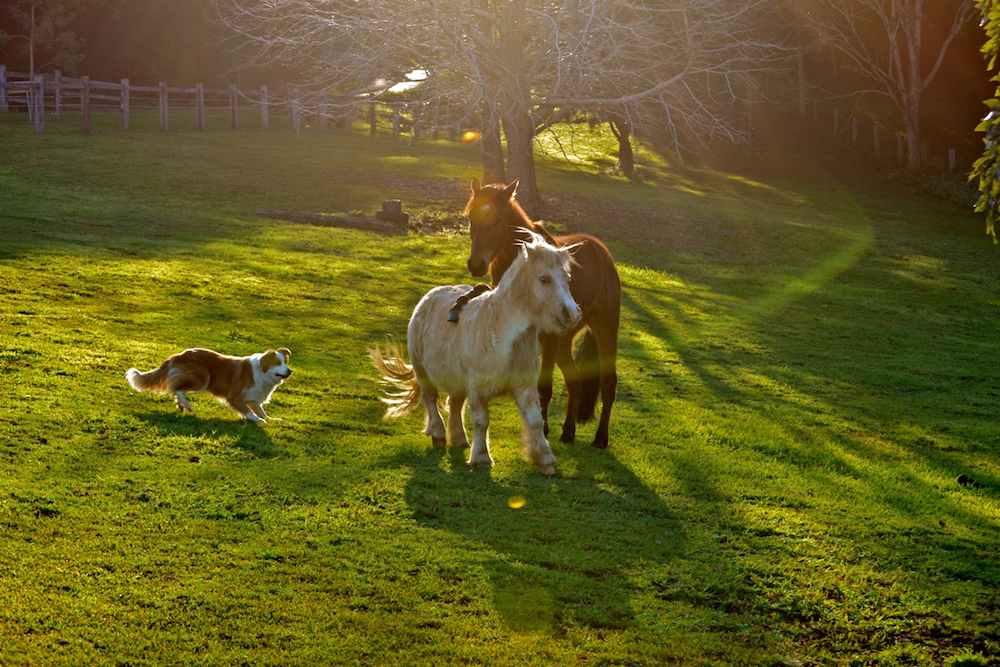
Tommy the Brumby making friends with Butters the Shetland pony, while Honey looks on. Photo: Beate Sommer
Buffalo is the lead ‘stallion’ (he is really a gelding) and he leads with invisible threads running between him and his herd members. To the novice it might be difficult to determine who is boss, because leadership has a very different meaning among horses. Only Buffalo’s energetic presence speaks of leadership. He is happy in his own space and doesn’t nag or harass. He leads his herd members but he doesn’t control them. Leading up to action, he stands back and observes for a long time. He moves in mindfully, acts directly and swiftly and then returns to relaxation. He is patient, kind and loyal. Buffalo has true presence.
Tammie is twenty-four and the lead mare, not the most dominant mare in The Herd but the steady and reliable one. I call her wife number one to Buffalo because she has also been here the longest. Her behaviour around Tommy is fascinating. At times she will discipline the youngster and give him chase, only to come over to me afterwards as if to ask: “Was that okay?” Maybe I am the lead mare in those moments. I stroke her neck and acknowledge her for her wisdom.
Not interfering in herd behaviour allows the horses to show Tommy the ropes and this helps me in training him. ‘Showing the ropes’! What an interesting expression. I will be showing him the ropes too, literally, lead rope, lunging rope…
There is something raw and real about a Brumby, like a special energy. My Palomino Buffalo, who is now twelve, is also a Brumby and he comes from the same area as Tommy, the Guy Fawkes National Park. Brumbies are very quick to learn and have an uncanny ability to read you. They challenge you to be patient and a good leader more than even domestic horses. They also have a special ability to bond with their human. I have found this to be true with Buffalo and already Tommy is looking for me and I sense the beginning of a similarly strong bond. I love all my horses but the Brumbies hold a special fascination for me.
The media often portrays Brumbies as pests, inbred, diseased and a threat to the environment. The truth is, they are none of those things. The percentage of inbreeding is much lower than in domestically bred horses, Brumbies are usually not diseased or even wormy and their genetics are healthy and strong. Furthermore, humans certainly cause a lot more environmental damage than Brumbies ever could. It is also possible that in the not so far future Brumby genes might become sought after to refresh a weakened gene pool of the domestic horse.
I feel honoured to live, play and work with my two Brumbies, honoured and humbled at the trust and affection they offer me. I am also reminded of how much these animals have given to us humans. They went to war. They pulled heavy loads, worked the fields, mustered stock and served as transport. These days Brumbies are making appearances as safe mounts for children in Pony Club or reliable trail riding horses and they are winning their owners ribbons at shows. Let us honour our Brumbies for the integral part they play in Australian history and culture.
They also make wonderful therapy horses as Buffalo has proven for many years now. Tommy is already showing signs of becoming a trustworthy therapy horse as well. They are helping me to reconnect with that still centerpoint within, the timeless place of uniquely me. From here I feel the connection with Nature and Spirit. All is well. Horses are helping humans, and humans are helping horses.
For further information about the Brumbies please go to: savethebrumbies
You can contact Beate via her website: taketime2smellthehorses
The post Learning and teaching with Tommy and Buffalo appeared first on .
]]>The post Head, heart, horse and human – an awesome mix appeared first on .
]]>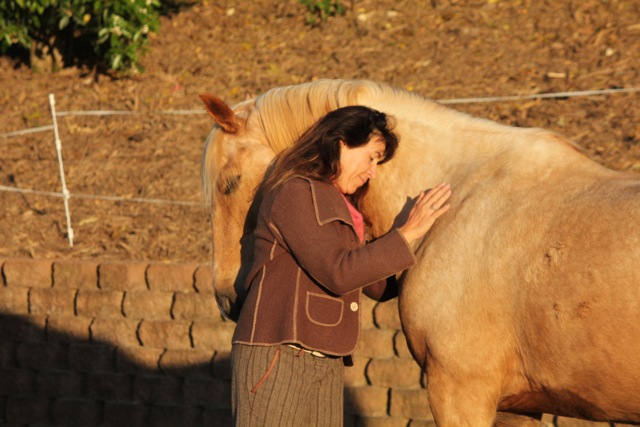
Mutual affection at Aurora Valley Take Time to Smell the Horses.
Psychotherapist, equine facilitated healer and Verandah Magazine columnist Beate Sommer suggests how we could learn some lessons from our equine friends.
What do visitors, retreat guests, working students and clients learn at Aurora Valley Take Time to Smell the Horses?
- Healthy breathing
- Awareness of how they function in life and in certain situations, reactive or responsive, defensive or receptive
- Rediscovery and use of the Three Centers of Intelligence:
- Head – thinking, analytical, logical
- Heart – feeling, emotions
- Gut – sensing, intuition
- Emotional wellbeing and recognizing emotions as valuable messages instead of judging and dividing them into good and bad
- Safety and belonging through connection with
- self
- other
- environment and nature
- Higher Force, God
- Being, presence in the moment, being felt and letting in attention
- Peripheral vision and lateral thinking
- How to be a sovereign being, how to know yourself and know that Good for one is only good when it is for the Greater Good
How do the horses help?
- Energy healing comparable to Reiki, the client may be sitting, standing, moving or lying down on a special healing table, the horses work through physical contact and also from a distance (see photo below)
- Life coaching while interacting with the herd or a particular horse, the horses are like mirrors reflecting energetic disturbances and blockages which show up in the behavior of the person
- Deep relaxation of the nervous system through meditation and conscious breathing, through this contact with the person’s own innate wisdom and healing ability
- Reawakening of the senses through interacting with horses and nature
- Unconditional acceptance, as horses do not pass judgment
- Playing and fun
What have I learned?
I learned (and continue to learn) all of which I now share with my clients and what I have mentioned above, such as:
Emotional fitness and balance, recognizing and accepting emotions as messengers, head-heart-gut intelligence, patience, trust in the natural unfolding of things, insight into when it is time to step forward and act and when to sit back, wait and let others…
Also, I do not put myself above the animals. I go amongst them with a genuine enquiry as to ‘What wants to happen?’ and ‘What can we learn from each other today?’. Through this a doorway into a new world has opened for me, a world full of awe and wonder, gratitude, joy, connection, love, deep healing and unlimited potential.
Reawaken your senses in nature and with The Herd at AURORA VALLEY. Notice, align and integrate your own innate wisdom. Take time to smell the horses.
Visit Beate Sommer’s website at www.taketime2smellthehorses.com or ring on 0408 247 965.
The post Head, heart, horse and human – an awesome mix appeared first on .
]]>The post Making horse sense of the senses appeared first on .
]]>Why do we say ‘something makes sense’ or ‘common sense tells me’ or ‘talking nonsense’? And what are we actually saying?
A sense is a physiological capacity of organisms that provides data for perception. The senses and their operation, classification and theory are overlapping topics studied by a variety of fields, most notably neuroscience, cognitive psychology (or cognitive science), and philosophy of perception. The nervous system has a specific sensory system or organ, dedicated to each sense.
The five traditionally recognized senses are:
- hearing
- sight
- taste
- smell
- touch
One might add:
- Vestibular – the perception of our body in relation to gravity, movement and balance, i.e. knowing you are moving when in an elevator, knowing whether you are lying down or sitting up and being able to walk a balance beam.
- Proprioception – the sense of the relative position of neighbouring parts of the body and strength of effort being employed in movement, it lets us know exactly where our body parts are, how we are positioned in space and to plan our movements, i.e. being able to clap our hands together with our eyes closed, write with a pencil and apply with correct pressure, and navigate through a narrow space. (7senses.org.au)
Therefore, senses are very much associated with the body and its physical functions providing information to the brain to be analyzed and processed.
However, when I think about common expressions containing the word ‘sense’, (here are a few more: ‘in a certain sense’, ‘bring someone to his senses’, ‘talk sense into someone’, ‘sensible’) it appears that mostly they relate to mind, being reasonable, level-headed, rational, intelligent and so on. In this sense, ‘sense’ appears to be relating more to cognitive functions and intellectual understanding.
There is also the well known description of our ‘sixth sense’, which is often explained as extrasensory perception (ESP). ESP involves the reception of information not gained through the recognized senses and not internally originated. According to the National Science Foundation ESP is listed as pseudoscience. The expression ‘sixth sense’ is somewhat misleading in that it falsely suggests that there is only one additional sense besides the traditional five senses. Humans have at least five additional senses that include: nociception (pain); equilibrioception (balance); proprioception and kinaesthesia (joint motion and acceleration); sense of time; thermoception (temperature differences); and possibly an additional weak magnetoception (direction).
And then there is the expression ‘horse sense’, meaning:
- Common sense; practical thinking as in:
Bob is no scholar but he has a lot of horse sense. Horse sense tells me I should not be involved in that project.[1]
- Sound practical sense, as in: She’s got too much horse sense to believe his story. [2]
- Ordinary practical knowledge of the best way to deal with people and situations.[3]
So where exactly do emotions fit into the picture??
Emotions are a mostly unacknowledged sense and have the whole body as their sensory organ. According to Dr. Candace Pert, the internationally recognised pharmacologist emotion is not exclusively generated by the brain but in sites all through the body and especially in the heart and the gut. Hence the expression ‘having a gut feeling’.
Horses have large and sensitive guts and therefore increased surface area for resonating with emotional energy. Animal scientist and notable Autistic Dr. Temple Grandin says that horses make sound, emotion-based decisions all the time. To horses, emotion is simply information.
In horse-human interactions, the horse senses underlying emotions, detecting the minutest changes in blood pressure, temperature, smell, body language, breathing and so on. If the human is putting on a face of confidence or cheerfulness while feeling frustrated, angry, afraid or sad, the horse detects this ‘mask’ as being incongruent with the muscle tension, raised heart rate, blood pressure and smell of the suppressed emotion.
When Grandin www.grandin.com talks about the emotion of ‘fear’, she mentions slow fear and fast fear. She says with slow fear the physical path through the brain takes twice as long than with fast fear. A scary stimulus coming in through the senses goes to the thalamus deep inside the brain, then to the cortex at the top of the brain for analysis.
With fast fear, the sensory information goes straight from the thalamus to the amygdala, avoiding the cortex. We have both options because we can’t get fast speed and accuracy in the same system. Fast fear can be so fast because it sacrifices accuracy.
The amygdala is the part of the brain that plays a significant role in the processing of memory, emotional reactions, trauma and fear.
Dr. Andrew McLean, (Equine Cognition and Learning), writes that out of all the domestic animals the horse has the largest amygdala yet on the other hand the horse’s heart rate is significantly lowered when groomed by other horses at the base of the neck. He goes on saying this also happens to a degree when groomed by a human in this way.
I find the latter particularly fascinating because it shows the horse as having a finely tuned fear system with all the associated sensitivity and follow through action on one end of the spectrum and the ability to deeply relax the nervous system on the other which is exactly where clarity, healing and growth can occur.
Dr. Ellen Kaye Gehrke writes in her 2010 article The Horse-Human Heart Connection that measurements of Heart Rate Variability (HRV) by the Institute of Heart Math are suggesting humans may affect each other beyond verbal cues or body language, possibly through an electromagnetic field we radiate. She goes on to explain the HRV as heart rhythm patterns or the intervals between consecutive heartbeats which are independent of heart rate.
The same would be true then for horses and humans. With my own horses I have noticed that the more affectionate I am with them, the more I connect to deep gratitude and open myself to the healing and growth potential of our relationship the more the horses seek closeness and affection from me and the more there is a silent understanding developing. It is possible to direct emotional energy and intention towards another being and be received. It is my experience that a healing always goes both ways and that this holds true both for human-human and horse-human encounter (provided we allow it and put our intention to it).
Gehrke uses the terms ‘coherence’ and ‘incoherence’ and says it has been observed that when a ‘negative’ emotion such as anger or sadness is experienced, the heart rhythms become more erratic and imbalanced, whereas when a ‘positive’ emotion such as love or joy is experienced, the heart rhythm patterns seem more ordered and balanced.
However, I have also observed that horses seem to experience energy imbalances and blocks as tension such as when a person spends his/her energy keeping an emotion such as sadness or anger down and puts on a mask of cheerfulness or confidence (outside doesn’t match inside). I call this incongruent and I wonder if the heart rhythm patterns become more ordered and balanced once the person allows the suppressed emotion to surface (outside now matches inside) yet still feels it even if it is a so-called negative emotion.
It is my experience that I can feel comfortable and relaxed feeling uncomfortable when I allow the emotional energy to simply be and flow through me and when I take all judgments away from it.
Gehrke says that preliminary studies suggest that the horse’s HRV has a greater influence on the human than the other way round. In my mind this makes sense considering that horses are able to drop their heart rates so very low. Still, I like to think that an interchange, a healing between horse and human can benefit both providing sufficient safety is created first and an open, compassionate and allowing space is held by the facilitator. I see this as a balance between guiding and stepping out of the way to let Spirit come through.
To come back to the inquiry about use and meaning of expressions containing the word ‘sense’ it seems wise to broaden our understanding of what intelligence is. Let us reawaken our senses and spend regular time paying attention to what our body is saying to us. And if ‘horse sense’ is synonymous with common sense and practical thinking, all the more reason to use our gut and heart to assist our mind in decision making!
Reawaken your senses in nature and with The Herd at AURORA VALLEY. Notice, align and integrate your own innate wisdom. Take time to smell the horses.
Visit Beate Sommer’s website at www.taketime2smellthehorses.com or ring on 0408 247 965.
Sources:
- Jennifer Forsberg Meyer, What’s Your Horse Thinking? Horse & Rider (2015)
- Dr. Andrew McLean, Attachment Theory – The New Dimension, Horse Care & Health/ www.horsemagazine.com (2013)
- Dr Ellen Kaye Gerkhen, The Horse-Human Heart Connection, Results of Studies Using Heart Rate Variability published in NARHA’s STRIDES (2010) www.7senses.org.au
[1] McGraw-Hill Dictionary of American Idioms and Phrasal Verbs.
[2] The American Heritage® Dictionary of Idioms by Christine Ammer.
[3] Cambridge Idioms Dictionary, 2nd ed. Copyright © Cambridge University Press 2006.
The post Making horse sense of the senses appeared first on .
]]>The post Working in harmony to create healing appeared first on .
]]>I get by with a little help from my friends….Rose, Echo and Tatonka (from left to right) are channelling energy to the client on the healing table. Her friend is sounding a Tibetan Bowl.
Merlin the pony is working on the client’s solar plexus area both through physical massaging and energy transmission. Tatonka is holding space.
A moment of deep connection and gratefulness at the end of the session.
If you are interested in experiencing a unique horse experience contact Beate Sommer at Aurora Valley Take Time 2 Smell The Horses taketime2smellthehorses Heart Centered Emotional Intelligence and Energy Healing facilitated by HORSE.
The post Working in harmony to create healing appeared first on .
]]>The post If music be the food of love, play on appeared first on .
]]>When a group of nine musicians, singers, horselovers and healers all came together for a day with Beate Sommer’s herd of horses at Aurora Valley, just outside Bangalow, some very special magic happened, and it just goes to show that love, as the song says, is a many splendoured thing…
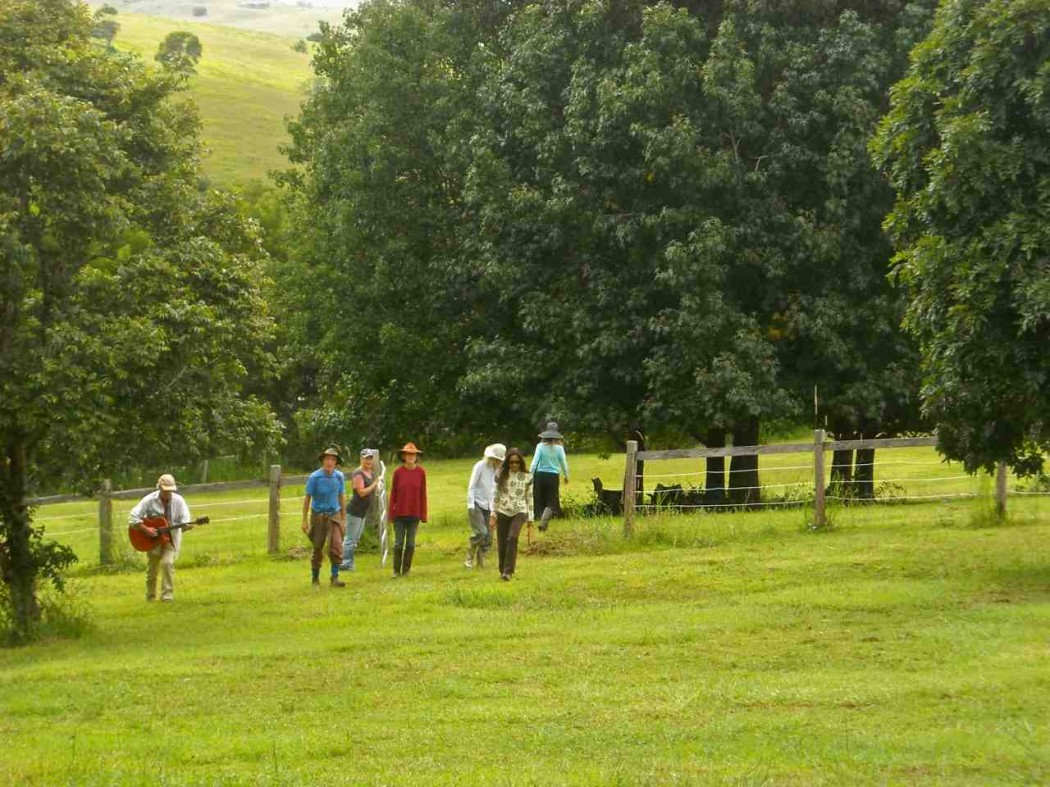
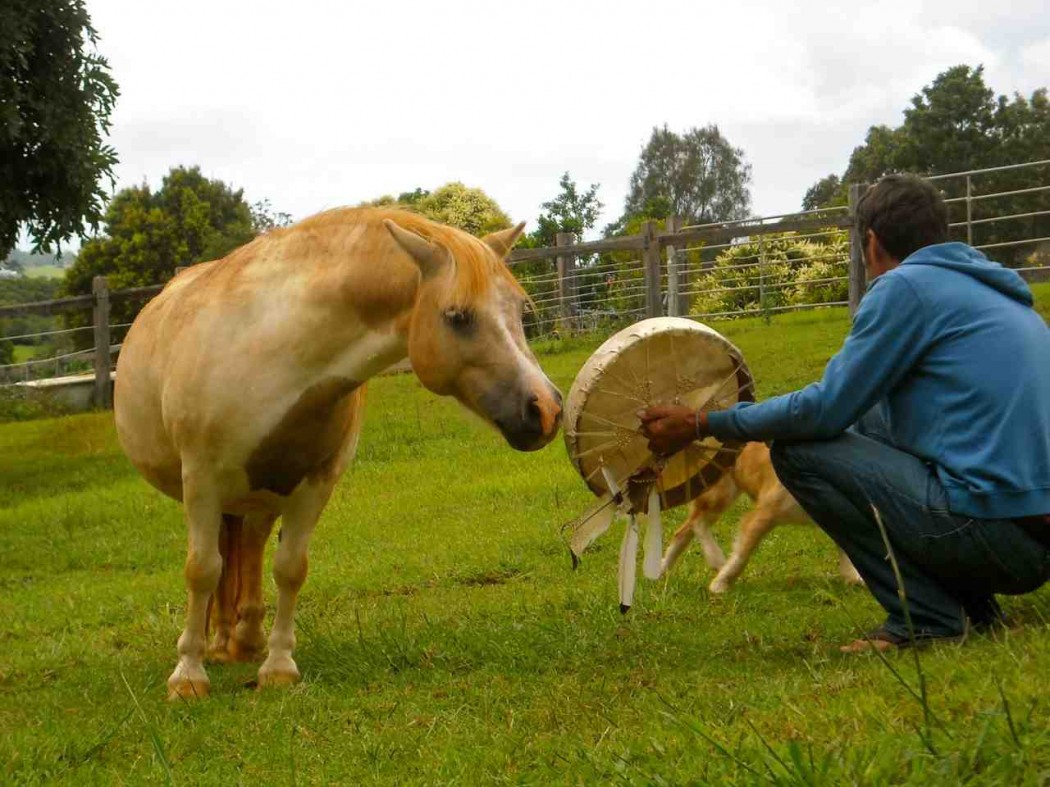
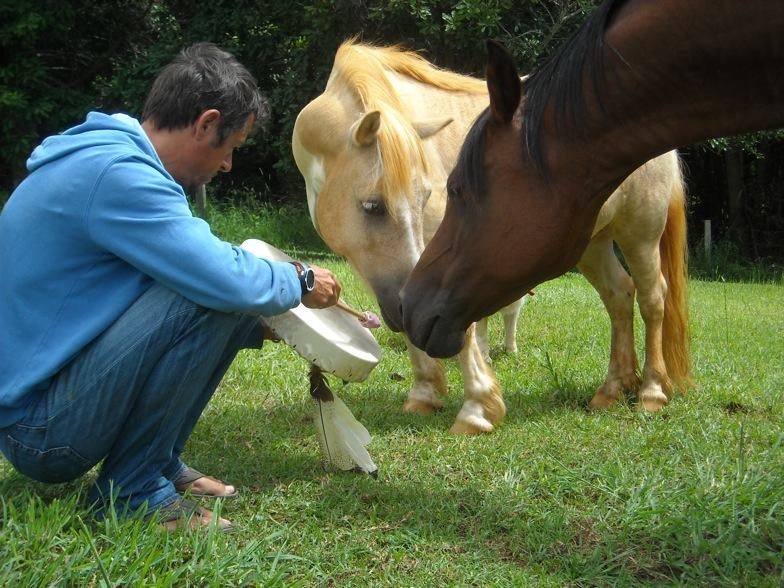
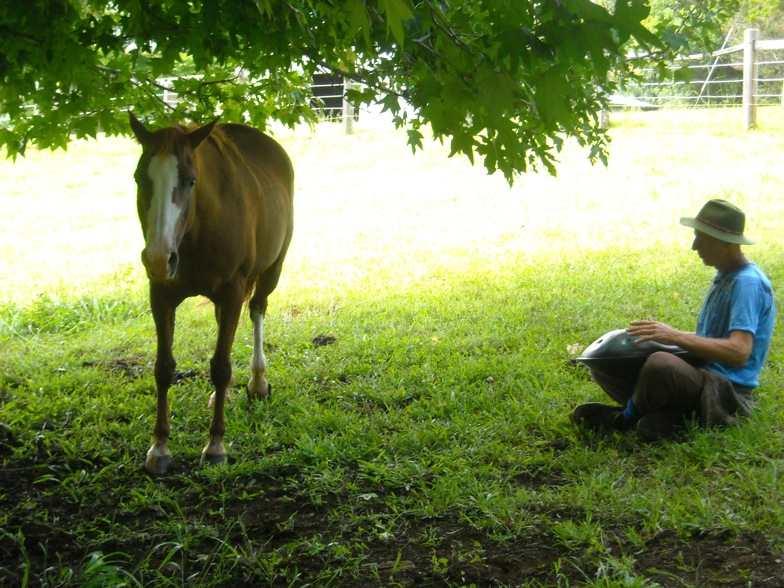
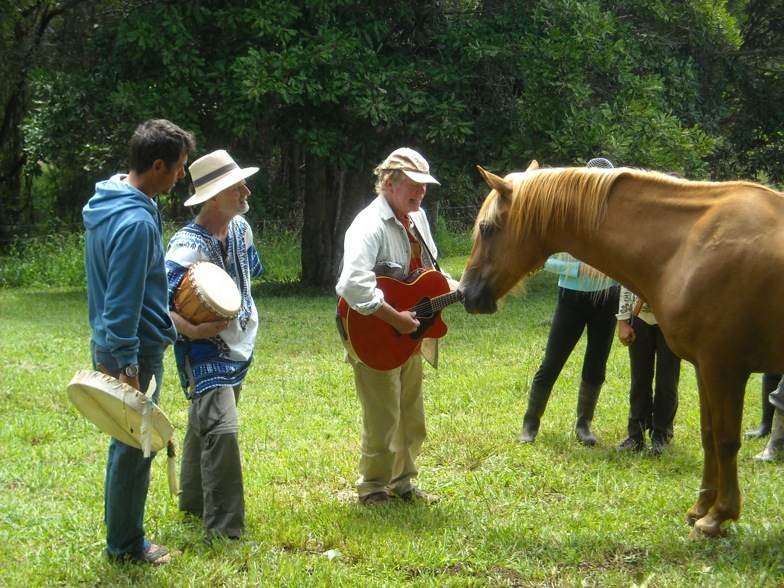
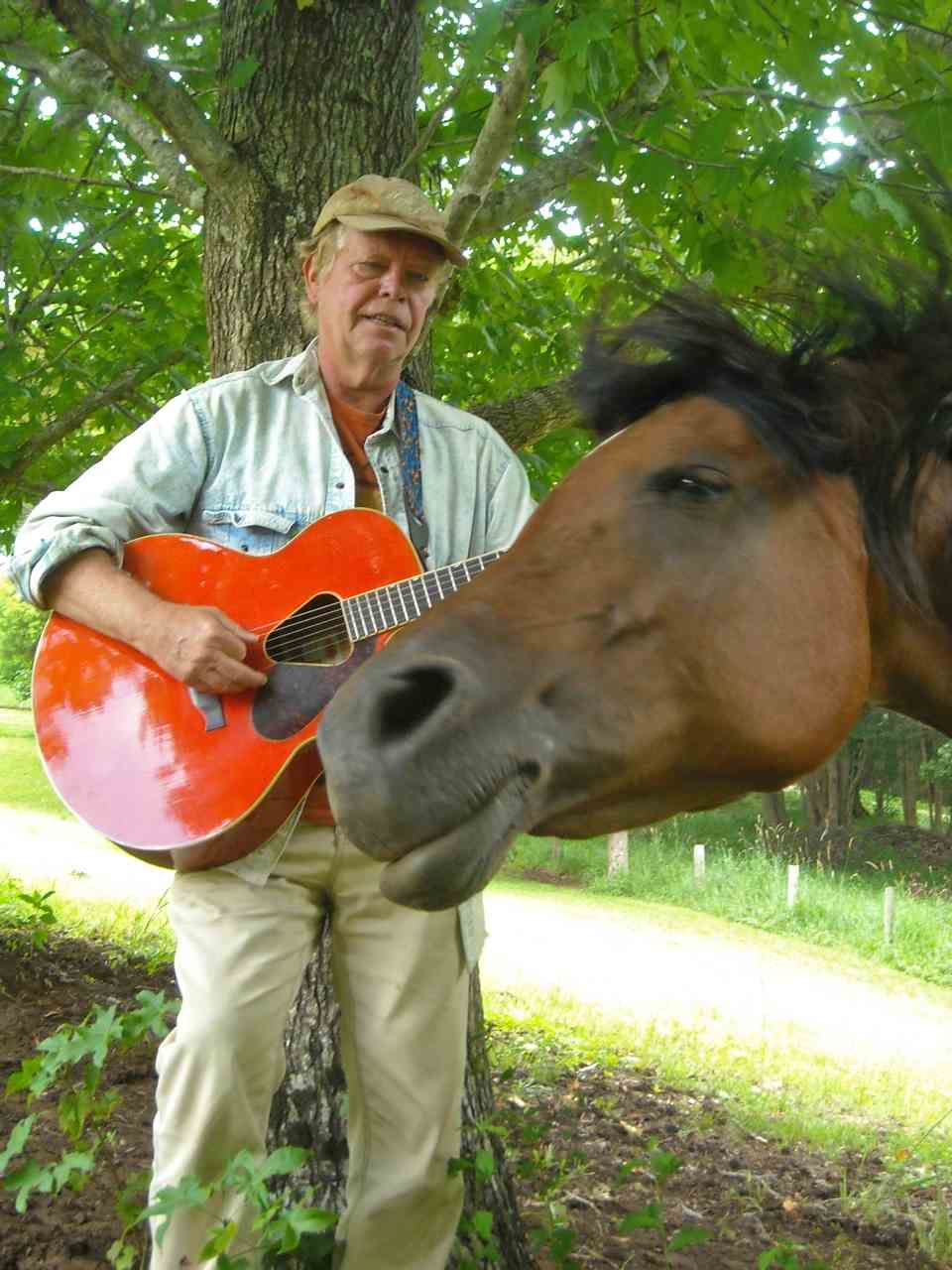
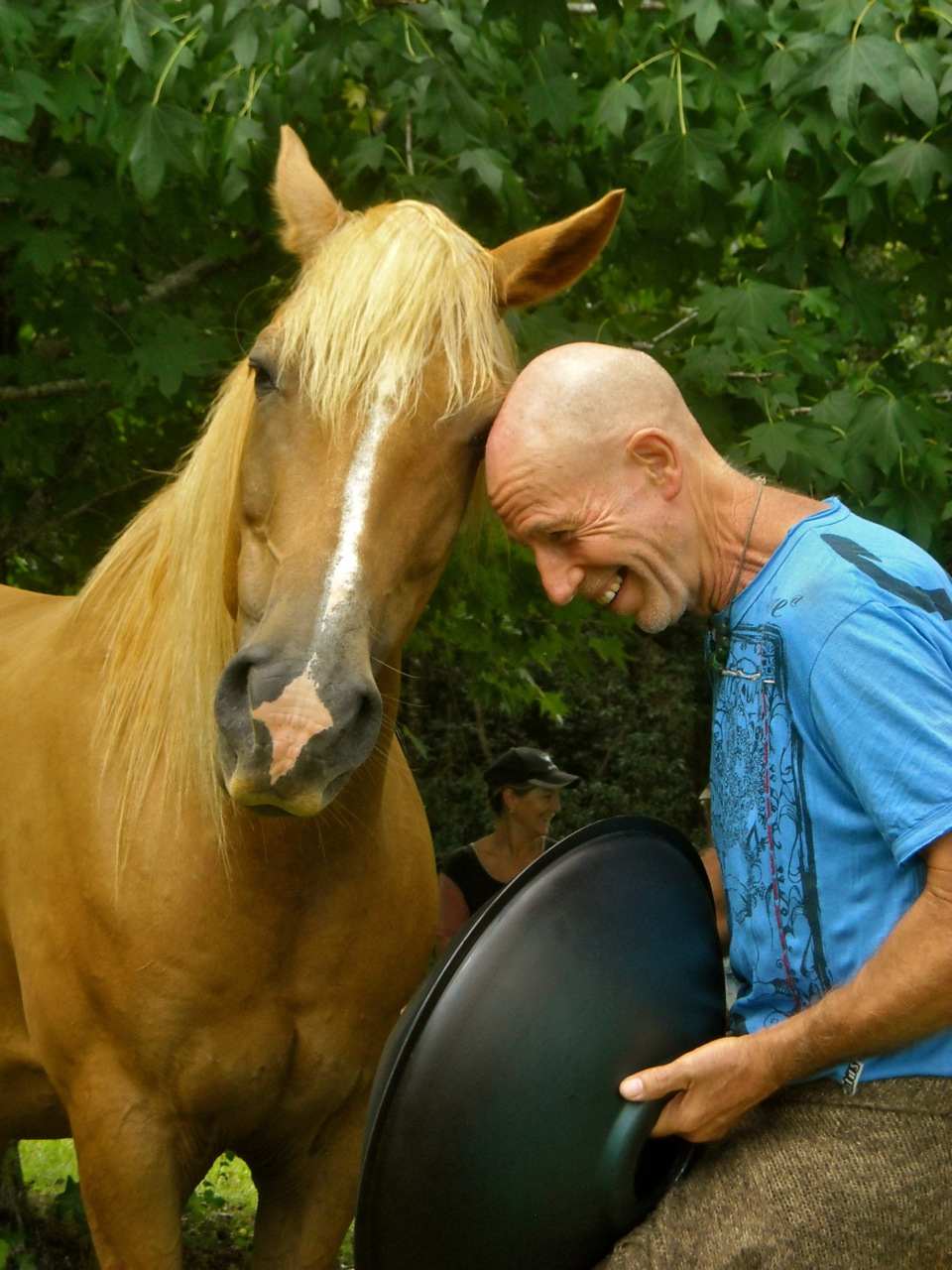
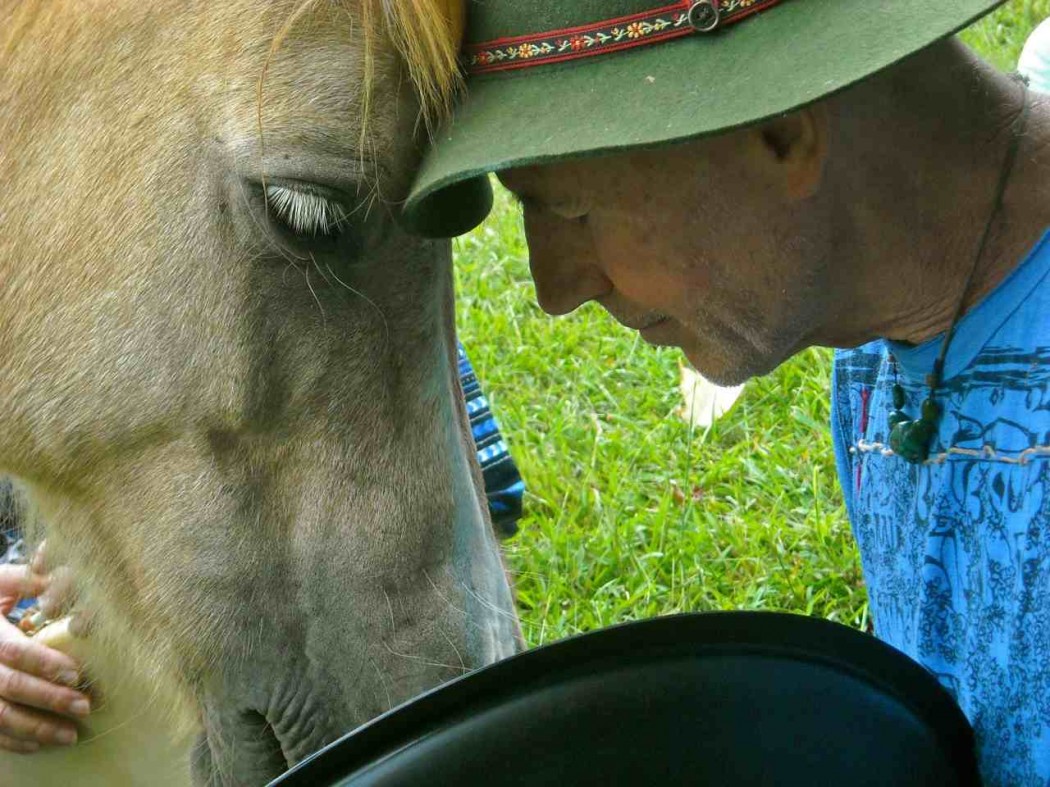
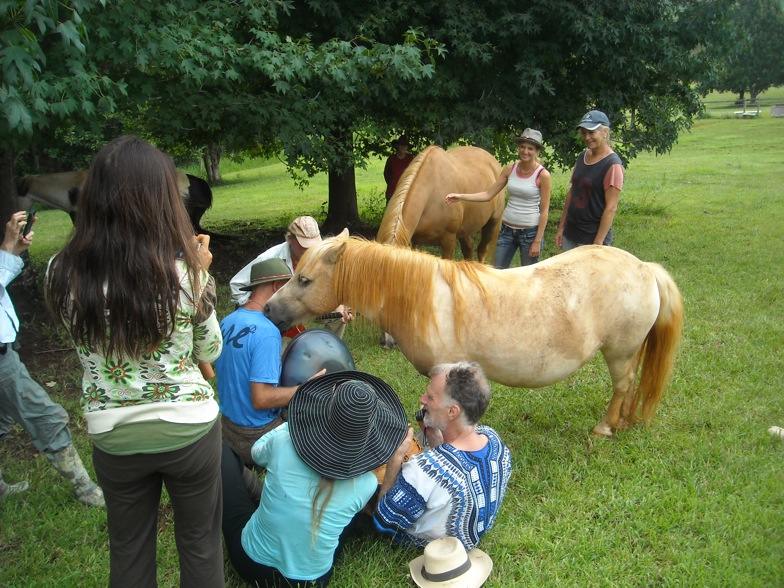
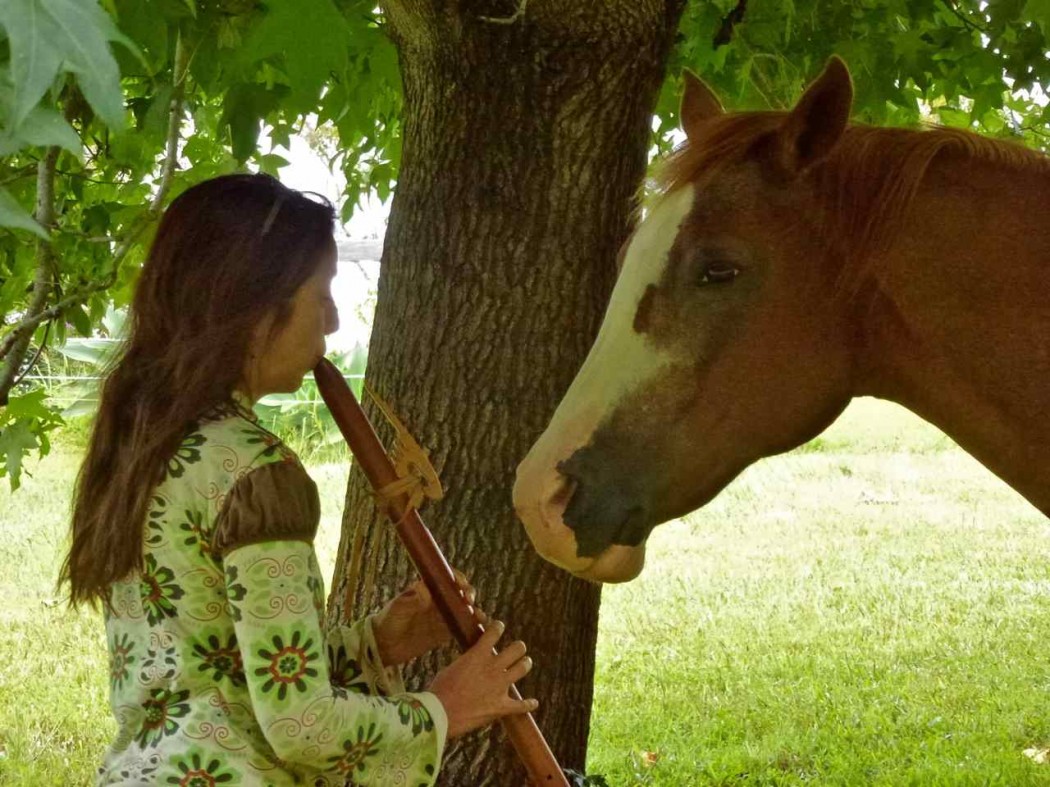
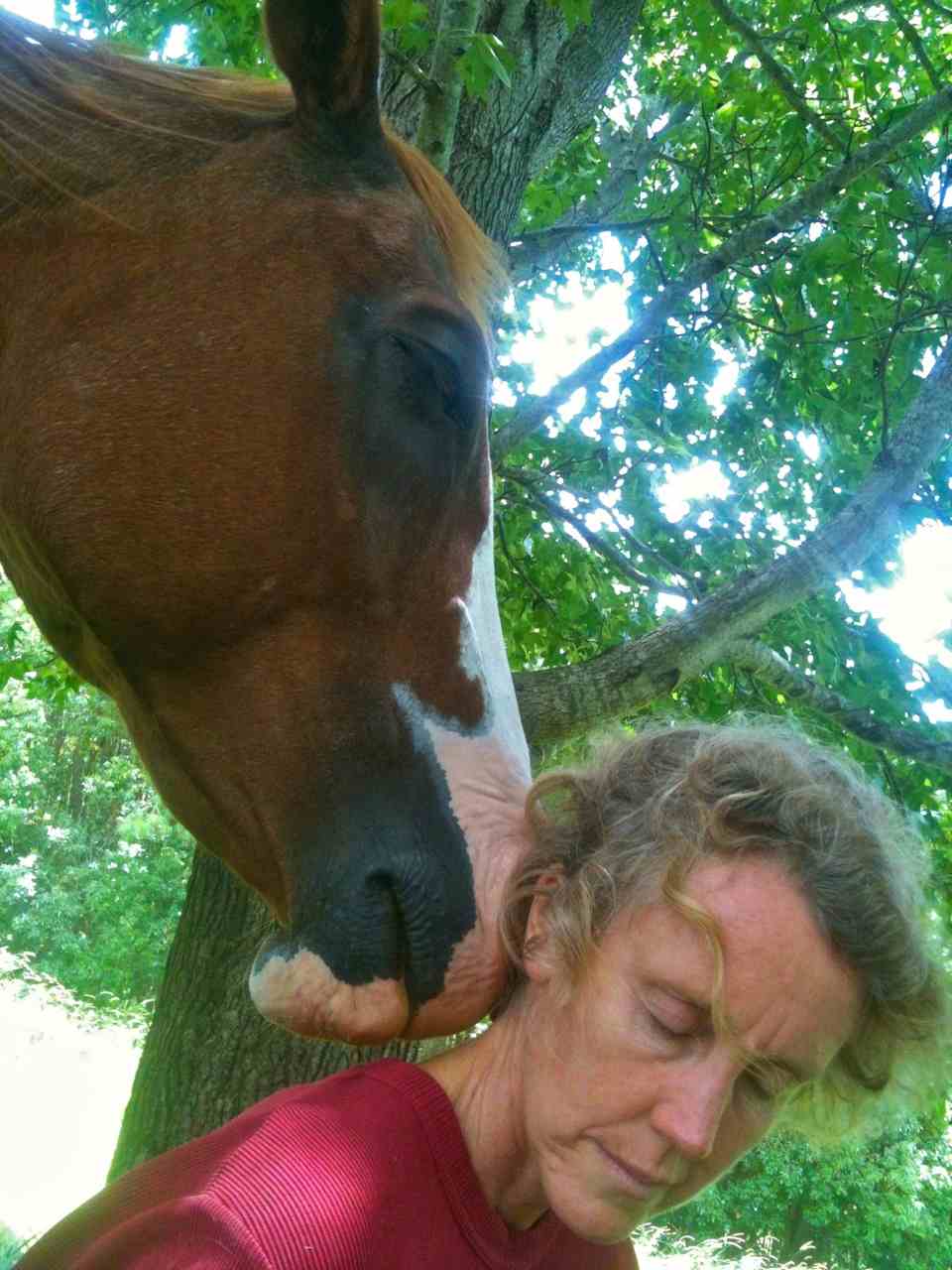
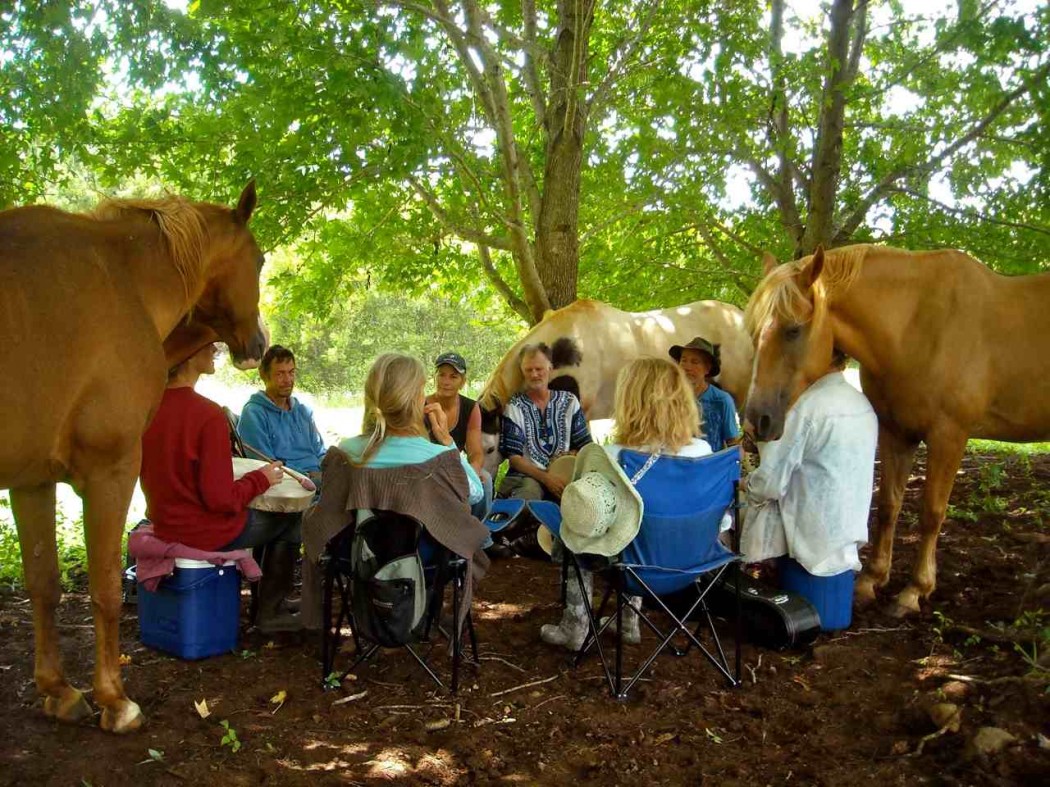
From the top:
The gathering; Butters, the Shetland pony, meets Ketan, from Switzerland; Butters and Ketan, and Rose joins in; Doug plays a tune to Tammie; Gary serenades Buffalo; Wild thing, you make my heart sing – Gary and Rose; Doug and Buffalo in the groove together; a little moment between Butters and Doug; the herd decides to hang out with the humans; Elvina and Tammie; Marliese and Tammie; Please don’t go…(Photography: Anne Schrimpf)
“It was an extraordinary experience,” says Sommer, “there was a mutual seeking out, admiration and enjoyment of each other’s company.”
If you are interested in experiencing a unique horse experience contact Beate Sommer at Aurora Valley Take Time 2 Smell The Horses taketime2smellthehorses Heart Centered Emotional Intelligence and Energy Healing facilitated by HORSE.
The post If music be the food of love, play on appeared first on .
]]>The post How a ‘soft’ horse connection helps us connect with ourselves appeared first on .
]]>Verandah Magazine’s spokesperson for all things ‘horse’, Beate Sommer from Aurora Valley, talks about how to have a ‘soft’ connection with our four-legged friends, and we can relate it to our two-legged companions as well…
Over the years I’ve often asked myself what exactly is ‘connection’ with our horses? Is it a physical feel? Is it mental clarity or an emotional flow? Or is it maybe all of those things.
What I’ve come to believe is that to me connection is a soft feel, a clear mind and emotional awareness. If the feel is not soft, the mind not clear and the emotions not flowing, it is not a connection, it’s more likely a disconnection or a block, or a distortion leading to a misunderstanding and miscommunication.
Horses notice everything around them, near and far, while being acutely aware of their internal environment at the same time. We can learn from horses how to become more attentive, how to sharpen our senses, how to be tuned into everything without losing connection with ourselves. They teach us how to bring our focus back to ourselves, how to notice, sense, assess, decide and act all in a short space of time, and then to return to ‘Self’ instead of having our focus hijacked and scattered. Horses are keenly observant yet without judgement. They take everything as it presents itself and experience energy in its purest form.
Misbehaviour in a horse is a form of communication. Looking at it from this perspective means we don’t have to judge it as bad and we don’t have to punish the horse. Horsemanship becomes a lot more inclusive instead of being exclusive. Everything is welcome and allows us to know the horse a little better. This is a step towards more softness and connection.
Just think how tolerant horses are of our misbehaviours! They are constantly trying to read us – our body language, our verbal cues, our thoughts and our emotions. Plus they can tune into our heart rate, body odours, even our slightest muscular tensions.
Horses also experience our misbehaviour as a form of communication. They sense when we are incongruent. Our incongruence lies in the energy blocks, the random and often unfocussed thoughts, our deeper and more hidden emotions, our intention and so on. Horses respond to these rather unconscious aspects of ourselves. They also respond to us when we are soft and connected and then they become soft too and we experience flow and harmony, even if just for the briefest moment. It is important to pause after such special moments to let them into your whole system so your being can remember the joy later on.
When we have softness we no longer need boundaries but until we have softness, boundaries are necessary. This is true for relationships with people too. Connection with our horses presupposes connection with Self. Let us be soft with ourselves, especially in moments of misbehaviour. If we can be soft in our approach to ourselves, the misbehaviour-like communication, the disconnection from that aspect, which communicates in a distorted way, will feel safe to be seen and acknowledged.
Learn to read yourself honestly and with kindness. Speak to yourself in the same way. Soften those parts within that have become rigid. Then we can relax and our brains can think of creative ways to be and do with the horse. Our hearts offer us the kindness and patience to make the best decision in each moment. Our gut tells us what is safe and what is not.
Practise connecting the three centers of intelligence: head, heart, gut.
I read somewhere that ‘hate is just a funny kind of love standing upside down’. I’m mentioning it because in a way any misbehaviour is like that… love standing upside down.
So, keep grounded, listen to your heart and gut, and be guided by Spirit. Then your mind will use its positive, creative intelligence and your decisions will be for the higher good of All.
AURORA VALLEY Take Time to Smell the Horses offers Natural Horsemanship with Emotional Awareness, Equine Assisted Learning and Equine Facilitated Energy Healing.
“Horses and Nature as a Path to Awakening, 31 Authentic Voice Cards for Heart Centered Emotional Intelligence – Daily Inspiration and Practical Wisdom straight from the Horse’s Mouth”
by Beate Maria Sommer
Available now from: taketime2smellthehorses
The post How a ‘soft’ horse connection helps us connect with ourselves appeared first on .
]]>The post HORSES HELPING HUMANS HELPING HORSES appeared first on .
]]>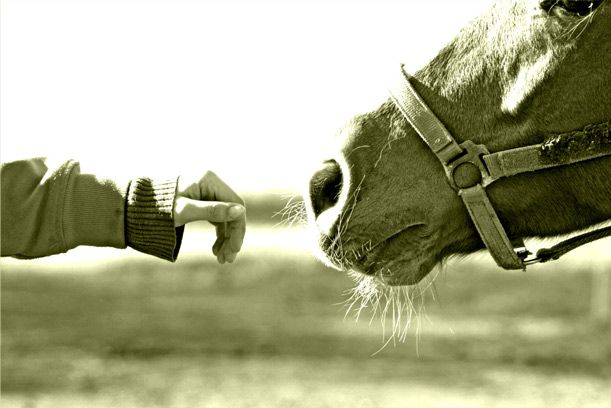
Beate Sommer, from Awakening Aurora, runs Equine Facilitated Learning sessions from her Bangalow property. This month she writes about the importance of emotional connection.
Maria Montessori, an Italian physician, educator and innovator acclaimed for her educational method building on the way children naturally learn, says of learning: “Have the patience to understand my ways,” and “Help me to do it myself.”
Attempting to interact, ride and train with emotional awareness and with an inner and an outer attitude that is not rigid but fluid and alive from moment to moment through attentiveness to yourself and the horse is incredibly rewarding.
Sometimes, exercises might seem “boring”, as one student said, however those very exercises are also attentive, patient, stress-free and sensitive; not through Action but through Being (feeling and being felt in the moments of stillness) and through aware and calm Doing. Sustainable and satisfying success never comes through dominance or by being the Alpha horse. It comes through “Please come with me,” and “Thank you.”
Both horse and rider benefit as a team, plus the person benefits generally in life. Your whole life can change through this way of being and doing with horses.
During an Equine Facilitated Learning Session and during Training your Horse with Emotional Awareness you will learn to:
Feel you.
Feel the horse.
Let the horse feel you.
Feeling leads to Discovering.
Discovering leads to Meeting.
Meeting leads to Connecting.
Take time.
Allow yourself to take time.
Allow the horse to take time.
Recognize yourself in difficult situations. Do you give up? Do you force a solution? Do you cry or do you get angry? What do you do habitually? Recognize your habitual behavior and choose a new one, a kinder and more creative one.
Be patient with yourself.
Be patient with the horse.
Connect with the horse and help it find the right answer.
Do the same for yourself.
Feel the other person.
Let the other person feel you.
Please visit Beate Maria Sommer’s website at taketime2smellthehorses.com email her on [email protected] or call her on 0408247965 to book your session.
The post HORSES HELPING HUMANS HELPING HORSES appeared first on .
]]>The post To lead, first lead yourself appeared first on .
]]>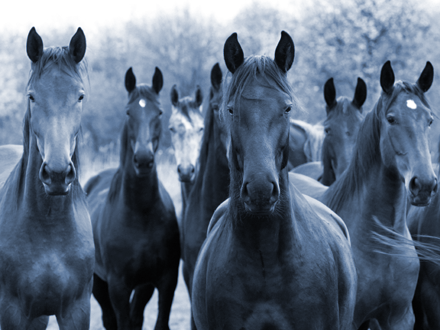
It was Winston Churchill who said ‘There is something about the outside of a horse that is good for the inside of a man’. Horses, writes Beate Sommer, from Awakening Aurora, can be leaders, followers and sometimes both.
I’ve found over the years that interacting with horses can show us a new way of leadership. But at the same time, leadership begins with leadership of yourself. The difference between horses and humans is that horses are complete within themselves yet at one with the herd, with their greater environment, with the earth and with Spirit. There is no separation. To me they are sovereign beings.
While it may look to us like there is a leader of the herd – and just by the way who is this leader, is it the stallion or is it the lead mare? – and a hierarchy, a pecking order, maybe these are just our own mental constructs as a way to describe and understand the horses social system from within our own reality.
The integrity of the herd is a close-knit tapestry with no herd member being more and another being less important or valuable. They are all equal because each one is a sovereign being.
When you are a sovereign being there is no need to establish a hierarchy or prove dominance. The need for competition doesn’t arise. You simply know who you are and through this inner knowing also feel the interconnectedness with everyone and everything. The good old “We are all One”!
With such a degree of sensitivity to Self and Other it is now possible to recognize and accept when it is a moment to step back and when it is time to step forward, when to act and when to be still and wait… because we are all connected, to ourselves, each other and the Greater Good.
‘We all have a unique vibration. Our life duty is to recover this unique vibration, this living image of The Holy One. We can help each other recover this vibration.’
from the Aramaic Beatitudes by Neil Donald Klotz
In fact, I have noticed with my own herd of horses that different horses step forward to lead in different situations. For example, the mare who appears to be the second lowest in the pecking order at feed time, is the one who will go first in a scary situation on a trail ride. She goes before the gelding who has the stallion position in my herd and who looks like the undisputed leader of his herd. He is like the stallion in a herd of wild horses with his mares. He leads with kindness, fairness, calmness and clarity and the other herd members respect him. The mare who comes across as the most dominant, certainly at feed time, is not the lead mare of the herd. She is often seen on her own, just a little distanced from the rest of the horses though these days I see her more frequently side by side with one of the other mares or with the little Shetland gelding who she mothered when he was new to the herd. The lead mare is a mare in the middle of the pecking order but when the herd is called from the big pasture they all come as soon as she makes the first move.
The horses know who they are and through this inner knowing also feel the interconnectedness with their herd (family), their greater environment (friends, work, community, nature, world) and with Spirit (God). They have the glue that binds. A lot of us have had this ‘holding together’ weakened through a lack of it in childhood. We may not have had the warm embrace and the support to bring all the inner parts together to One Whole. For me becoming whole with the horses is how we can learn to remember.
Awakening Aurora is running a soul collage workshop on Saturday November 15
Enter the sacred silence of our peaceful herd of horses at dawn
Energize your auric field in the rays of the rising sun
Welcome a new day together
Share a yummy breakfast (please bring a plate)
Awaken dormant parts of yourself through a creative and empowering arts activity
based on Soul Collage (bring glue stick and scissors, also old magazines if you have any, otherwise magazines and other art materials are provided)
When: Saturday, 15th of November from 5.05 – 11.00am
Where: AURORA VALLEY, Lot 5 Pacific Highway, Bangalow
www.taketime2smellthehorses.com
Investment: $40/ $35
Please wear closed shoes to go out with the horses.
Bookings: [email protected]
Mob. 0408247965
The post To lead, first lead yourself appeared first on .
]]>The post Talking, and listening to animals appeared first on .
]]>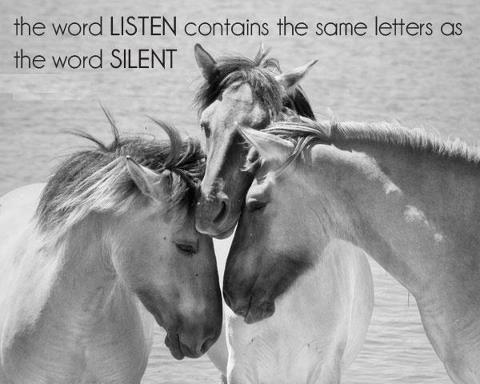
Photograph: Henri Thon, https://www.redbubble.com/people/hton/works/4526406-wild-horses-3
Awakening Aurora’s Beate Sommer writes about how clearly horses will communicate with us – if only we’ll listen.
The very first time I heard a horse speak to me she said: “You know, I like being groomed really gently, especially my mane!” In a moment of stillness I heard my Quarterhorse mare Ginger gently yet clearly. One might say I had been listening with my heart and this is true, however I actually heard her say these exact words, in plain English.
My youngest daughter has taken to saying; “Yes mum, we know! You can talk to the animals!” with THAT tone in her voice and look on her face. These days I simply reply: “Yes darling, I can” and leave it at that. I am neither embarrassed any longer nor do I need to convince anyone. It is a quiet affair between the animals and me and it involves a lot of listening on my part.
I have also had messages from the animals visually. Once I saw a brightly lit neon sign in front of my mind’s eye with a sentence on it. This is a beautiful story and I’d like to tell it:
I had brought on a young Anglo-Arabian gelding named Pablo. Originally for my daughter, he had come to us at the age of one and a half but by the time he was four my daughter had done her HSC, given up riding and moved away to study.
Pablo was an endearing horse but he suffered the most heartbreaking case of separation anxiety I had ever come across. It took all my patience, skill, love and the Herd’s expertise to settle him and bring out his brave and adventurous nature. He had become a solid, although a bit cheeky member of The Herd, had no more issues being separated from the other horses and made his way into everyone’s heart.
Yet I found I could not give him the time he needed under saddle as a Youngster and also felt he was the type of horse who wanted that one human who fussed over him and had him as her/his only horse. With a heavy heart I advertised him and prayed for a kind and knowledgeable new owner. She turned up eventually, fell in love with Pablo and bought him. They are doing very well together!
In the week after Pablo had left I noticed that my gelding Buffalo’s behavior was a bit odd. I even called him grumpy. He would put his ears flat back, make threatening gestures with his hind legs and harass the other horses. He looked generally out of sorts.
One day during this week, while I was giving a Reiki session to a woman lying on the massage table in the yard – with the horses present who frequently step up to the table and work on clients as well and/or gather around to hold space- I had my eyes closed and her head was gently resting in my hands, when suddenly I had a vision of a Golden Palomino stepping towards me and this neon sign popped up above his head with bright red letters flashing “We are still grieving the loss of Pablo.” I had startled, opened my eyes and there was Buffalo, my golden Palomino gelding, directly looking at me from across the yard with a focused intensity which left no room for second-guessing.
He wasn’t grumpy! He was sad and needed to grieve!
That afternoon I got the horses a Bush Flower Essence for letting go and grieving, rang Pablo’s new owner to assure myself they were doing well and then went out into the paddock to converse with The Herd. I put drops of the Bush Flower Essence on the palm of my hand and offered them to each horse. They all lapped them up eagerly.
The following day, Buffalo was much calmer and I got the distinct impression that all the horses had been through an energetic shift.
We all do miss our little Mr. Pablo though! Here is a picture of him during a different type of interspecies communication…but that’s a story for another day…
You can find out more about Beate Sommer on taketime2smellthehorses
The post Talking, and listening to animals appeared first on .
]]>